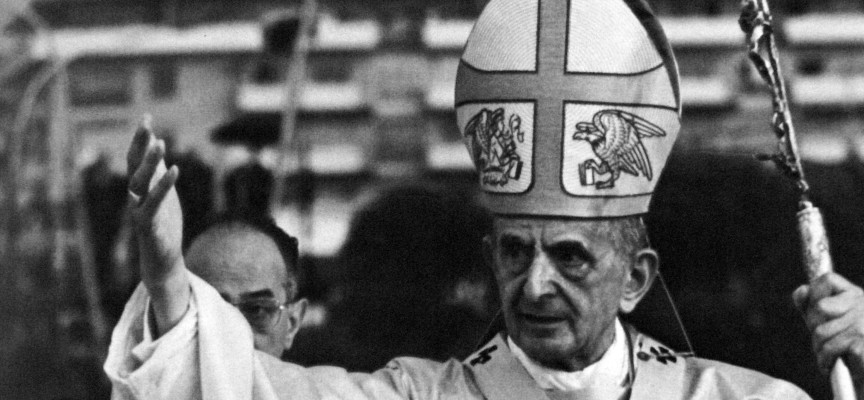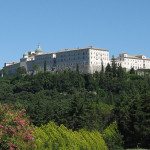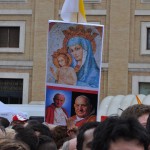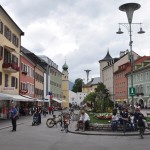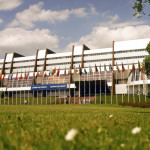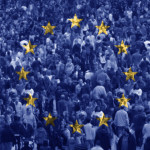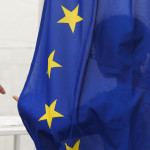“Pius XII greeted St. Benedict as the ‘Father of Europe’ because he inspired the peoples of this continent with the loving care of order and justice as the basis of true sociality. The same Predecessor of Ours wished that God, through the merits of this great saint, would reward the efforts of those who are trying to generate brotherhood among these European nations. Even John XXIII, in his paternal solicitude, wished very much that this happened. It is therefore natural that We join them in giving Our full consent to this movement, which is working for the achievement of European unity”.
This passage is taken from the Apostolic Letter Pacis nuntius by means of which Paul VI, on October 24, 1964, proclaimed St. Benedict of Norcia the “main patron saint of Europe”.
Today we celebrate the 50th anniversary of the publication of this Apostolic Letter. There are six patron saints of Europe by now: St. Benedict was joined by Cyril and Methodius, Catherine of Siena, Bridget of Sweden, and Therese Benedicta of the Cross, whose original name was Edith Stein.
The growth in the number of patron saints (both men and women) of Europe confirms that the endorsement of Paul VI to the “movement tending to the achievement of European unity” was successful in involving his successors to endorse the idea of Europe launched by Schuman, De Gasperi, and Adenauer.
In 1967, three years after the publication of Pacis nuntius, when addressing the representatives of the European Economic Community (EEC) and Euratom, Pope Paul VI said: “You have implemented – and you are improving it day after day – a real network of relationships which is founded no longer on the predominance of the strongest player but on common interests that tend to stipulate agreements and exchange-based services”.
The Pope noted that by doing so it would be possible to “ensure a durable order in Western Europe, and to make actually impossible – you can finally hope it for this time – any new European wars”.
A united Europe was beginning to become the path of Isaiah, the path of peace in the world, and Paul VI could say: “That’s why the Church approves and encourages you. That’s why she willingly offers her moral principles and her spiritual forces for the building that is being constructed in Europe, as particularly cohesive elements”.
On May 29, 1967, the European thought of Paul VI became even stronger. When addressing the EEC and Euratom, in fact, he stated: “We have the joy of congratulating you, representatives of EEC and Euratom – you are Europe on its own way – for the excellent and patient work you have carried out, thanks to which you have overcome, one by one – through the vicissitudes which are typical of all human enterprises – all the difficulties that oppose the creation of the European Union, a union that many wise and inspired people consider not only as desirable but necessary and urgent, first of all on the economic level and later on, if possible, on the political level – of course respecting at the same time the diversity imposed by history”.
In his message of January 26, 1977, Pope Montini wrote to the Council of Europe which had just opened its headquarters in Strasbourg: “Also the Holy See looks at the future of Europe with realism and hope. The conditions and the social, cultural, legal and spiritual needs of the peoples of Europe are in its eyes valuable indications to awaken consciences and to define the field in which they can exercise their creative dynamism”.
The awakening of consciousness, called upon and required in a historical situation which was very different from today, remains a warning to a European Union which is struggling to find the direction of its journey in the history of the world.
In a few weeks, on November 25, the voice of Francis, the Pope who on October 19 will beatify Paul VI, will resound in the European rooms in Strasbourg. Not a few of us will hear the echo of Pacis nuntius by Pope Montini.
“Pio XII salutò san Benedetto ‘padre dell’Europa’ in quanto ai popoli di questo continente egli ispirò quella cura amorosa dell’ordine e della giustizia come base della vera socialità. Lo stesso Predecessore Nostro desiderò che Dio, per i meriti di questo grande santo, assecondasse gli sforzi di quanti cercano di affratellare queste nazioni europee. Anche Giovanni XXIII, nella sua paterna sollecitudine, desiderò vivamente che ciò avvenisse. È quindi naturale che pure Noi, a questo movimento, tendente al raggiungimento dell’unità europea, diamo il Nostro pieno assenso”.
Il passo è tratto dalla lettera apostolica Pacis nuntius con la quale di Paolo VI, il 24 ottobre 1964, proclamava san Benedetto abate “patrono principale dell’intera Europa”.
Sono trascorsi esattamente 50 anni dalla pubblicazione della lettera apostolica. I patroni di Europa sono diventati sei: a san Benedetto si sono aggiunti Cirillo e Metodio, Caterina da Siena, Brigida di Svezia e Teresa Benedetta della Croce, al secolo Edith Stein.
La crescita del numero dei santi e delle sante protettori dell’Europa conferma che l’assenso di Paolo VI al “movimento tendente al raggiungimento dell’unità europea” ha coinvolto i suoi successori nel sostegno all’idea di Europa di Schuman, De Gasperi, Adenauer.
Nel 1967, tre anni dopo la pubblicazione della Pacis nuntius, rivolgendosi ai rappresentanti della Comunità economica europea (Cee) e dell’Euratom papa Montini affermava: “Voi avete messo in atto e lo perfezionate da un giorno all’altro una rete concreta di relazioni fondata non più sulla predominanza del più forte ma su degli interessi comuni tendenti a concludere degli accordi e scambiare dei servizi”.
Il Papa rilevava che così facendo si giungeva ad “assicurare un ordine durevole nell’Europa occidentale e a rendervi effettivamente – si può sperarlo questa volta – impossibili delle nuove guerre europee”.
L’Europa unita incominciava a diventare il sentiero di Isaia, il sentiero della pace nel mondo e Paolo VI poteva affermare: “Ecco perché la Chiesa vi approva e v’incoraggia. Ecco perché vi offre di cuore i suoi principi morali e sue forze spirituali che sono, per l’Edificio dell’Europa che si costruisce, un elemento di coesione di primo ordine”.
Il 29 maggio 1967 il pensiero europeo di Paolo VI diventa ancor più incisivo. Rivolgendosi alla Cee e all’Euratom affermava infatti: “Abbiamo la gioia di felicitarci con voi della Cee e di Euratom – che siete l’Europa in cammino – di felicitarci con voi per l’eccellente e paziente lavoro cui vi siete dedicati; grazie al quale sono state sormontate una a una – attraverso le vicissitudini proprie di tutte le imprese umane – tutte le difficoltà che si oppongono alla realizzazione dell’unione europea, unione che tante persone di saggia ispirazione considerano non solo come desiderabile ma come necessaria e urgente, prima di tutto sul piano economico e in seguito se possibile – beninteso nel rispetto delle diversità imposte dalla storia – sul piano politico”.
Nel messaggio del 26 gennaio 1977 al Consiglio d’Europa che inaugurava la sua sede a Strasburgo papa Montini scriveva che “la Santa Sede guarda anch’essa l’avvenire dell’Europa con realismo e speranza. Le condizioni e le necessità sociali, culturali, giuridiche e spirituali dei popoli europei costituiscono ai suoi occhi delle indicazioni preziose per risvegliare le coscienze e definire il campo in cui esercitare il loro dinamismo creativo”.
Il risveglio della coscienza, auspicato e richiesto in una situazione storica assai diversa dall’attuale, rimane un monito a un’Unione Europea che fatica a ritrovare la direzione del suo cammino nella storia del mondo.
Tra poche settimane, il 25 novembre, la voce di Francesco, il papa che il 19 ottobre proclamerà beato Paolo VI, si leverà nelle aule europee di Strasburgo. Non pochi udranno l’eco della Pacis nuntius di papa Montini.
L’écho des paroles de Paul VI
“Pie XII salua dans saint Benoît le ‘père de l’Europe’ pour avoir inspiré aux peuples de ce continent ce souci et cet amour de l’ordre et de la justice, comme base de la vraie vie sociale ; et Notre Prédécesseur désirait que Dieu, par les mérites de ce grand saint, seconde les efforts de tous ceux qui s’efforcent d’établir les liens d’une véritable fraternité entre les nations européennes. Jean XXIII, lui aussi, dans sa paternelle sollicitude, désirait vivement qu’il en soit ainsi. Il est donc naturel que Nous aussi Nous donnions Notre plein assentiment à ce mouvement qui tend à réaliser l’unité de l’Europe”.
Ce passage est tiré de la lettre apostolique Pacis nuntius par laquelle Paul VI, le 24 octobre 1964, proclamait saint Benoît, abbé, “patron principal de toute l’Europe”.
50 ans ont passé depuis la publication de la lettre apostolique. Les saints patrons de l’Europe sont devenus six : à saint Benoît se sont ajoutés Cyrille et Méthode, Catherine de Sienne, Brigitte de Suède et Thérèse Benoîte de la Croix (de son vrai nom Édith Stein).
L’augmentation du nombre des saints protecteurs et des saintes protectrices de l’Europe confirme que l’assentiment de Paul VI au “mouvement qui tend à la réalisation de l’unité de l’Europe” a impliqué ses successeurs dans le soutien de l’idée de l’Europe qu’avaient Schuman, De Gasperi et Adenauer.
En 1967, trois ans après la publication de Pacis nuntius, s’adressant aux représentants de la Communauté économique européenne (CEE) et de l’Euratom, le pape Montini affirmait: “Vous avez mis en place et vous perfectionnez de jour en jour un réseau concret de relations fondées non plus sur la prédominance du plus fort, mais sur des intérêts communs, amenant à conclure des accords et à échanger des services”.
Le Pape soulignait qu’en agissant de la sorte, on visait à “assurer un ordre durable en Europe occidentale, et à y rendre impossibles effectivement – on peut l’espérer, cette fois – de nouvelles guerres européennes”.
L’Europe unie commençait à devenir le sentier d’Isaïe, le sentier de la paix dans le monde, et Paul VI pouvait affirmer: “Voilà pourquoi l’Église vous approuve et vous encourage. Voilà pourquoi elle vous offre de grand cœur l’appui de ses principes moraux et de ses forces spirituelles, qui sont, pour l’édifice de l’Europe qui se construit, un élément de cohésion de premier ordre”.
Le 29 mai 1967, la pensée européenne de Paul VI se fait encore plus incisive. S’adressant à la CEE et à l’Euratom, il affirmait: “Nous avons bien des raisons de Nous réjouir et de vous féliciter de l’excellent et patient travail auquel vous vous livrez, et grâce auquel sont surmontées une à une – à travers les vicissitudes inhérentes à toutes les entreprises humaines – les difficultés qui s’opposent à la réalisation de l’union européenne : union que tant de bons esprits, aujourd’hui, considèrent non seulement comme désirable, mais comme nécessaire et urgente, sur le plan économique d’abord, et ensuite, s’il se peut – et, bien entendu, dans le respect des diversités imposées par l’histoire – sur le plan politique”.
Dans son message du 26 janvier 1977 au Conseil de l’Europe qui inaugurait son siège à Strasbourg, le pape Montini écrivait que “le Saint-Siège regarde lui aussi l’avenir de l’Europe avec réalisme et espérance. Les conditions et les nécessités sociales, culturelles, juridiques et spirituelles des peuples européens constituent, à ses yeux, des indications précieuses pour éveiller les consciences et leur désigner le champ où doit s’exercer leur dynamisme créateur”.
Le réveil de la conscience, souhaité et requis dans une situation passablement différente de celle d’aujourd’hui, constitue un avertissement pour une union européenne qui peine à retrouver son chemin dans l’histoire du monde.
Dans quelques semaines, le 25 novembre, la voix de François, le pape qui le 19 octobre proclamera Paul VI bienheureux, s’élèvera dans les salles européennes de Strasbourg. Ils ne seront pas rares ceux qui y percevront l’écho de Pacis nuntius du pape Montini.
Das Echo auf die Worte von Paul VI.
“Pius XII. nannte den heiligen Benedikt „Vater von Europa“ weil er den Völkern dieses Kontinents die liebevolle Sorgfalt um Ordnung und Gerechtigkeit als Grundlage wahrer Soziabilität inspirierte. Auch mein Vorgänger wünschte, dass Gott durch die Verdienste dieses großen Heiligen die Bemühungen jener unterstützen möge, die versuchten, die europäischen Länder zu vereinigen. Auch Johannes XIII. wünschte sich in seiner väterlichen Fürsorge sehr, dass dies geschehen möge. Es ist daher natürlich, dass auch ich dieser Bewegung, die darauf hinzielt ein geeintes Europa zu erreichen, meine volle Zustimmung gebe”.
Der Ausschnitt ist dem Apostolischen Schreiben Pacis nuntius entnommen, mit dem Paul VI. am 24. Oktober 1964 den heiligen Abt Benedikt zum “Hauptpatron von ganz Europa” erklärte.
Seit der Veröffentlichung des Apostolischen Schreibens sind genau 50 Jahre vergangen. Schutzpatrone Europas gibt es inzwischen sechs: dem heiligen Benedikt wurden Kyrill und Methodius, Katharina von Siena, Birgitta von Schweden und Teresia Benedicta vom Kreuz, bekannt als Edith Stein, hinzugefügt.
Die wachsende Zahl an heiligen Frauen und heiligen Männern als Patrone Europas bestätigt, dass die Zustimmung von Paul VI. zur “Bewegung, die darauf hinzielt ein geeintes Europa zu erreichen” auch seine Nachfolger dazu bewegt hat, die Idee von Europa wie sie Schuman, De Gasperi, und Adenauer hatten, zu unterstützen.
Im Jahre 1967, drei Jahre nach der Veröffentlichung von Pacis nuntius, richtete Papst Montini folgende Worte an die Vertreter der Europäischen Wirtschaftsgemeinschaft (EWG) und der Euratom: “Sie haben ein sich Tag für Tag verbesserndes, konkretes Netzwerk von Beziehungen verwirklicht, das nicht mehr auf der Vorherrschaft des Stärkeren, sondern auf den gemeinsamen Interessen basiert und sich daraufhin orientiert, Vereinbarungen abzuschließen und Dienstleistungen auszutauschen”.
Der Papst unterstrich, dass man es auf diese Weise erreiche “eine dauerhafte Ordnung innerhalb von Westeuropa zu sichern und dadurch effektiv – diesmal könne man es wirklich hoffen – den Ausbruch neuer europäischer Kriege unmöglich zu machen“.
Das geeinte Europa begann zum Weg von Jesaja zu werden, dem Weg des Friedens in der Welt, und Paul VI. konnte erklären: “Deswegen bejaht und ermutigt euch die Kirche. Deswegen bietet sie euch von Herzen ihre moralischen Grundsätze und ihre geistigen Kräfte an, die für den Aufbau von Europa ein ausgezeichnetes Element des Zusammenhalts sind“.
Am 29. Mai 1967 wird der europäische Gedanke von Paul VI. noch eindrücklicher, denn er wendet sich an die EWG und die Euratom mit folgenden Worten: “Mit Freude beglückwünschen wir euch von der EWG und der Euratom – die ihr das werdende Europa seid – wir beglückwünschen euch für die ausgezeichnete und geduldige Arbeit, deren ihr euch gewidmet habt. Durch sie wurden nach und nach – auch durch das Auf- und Ab, das allen menschlichen Unternehmungen eigen ist – alle Schwierigkeiten überwunden, die sich der Verwirklichung eines geeinten Europas widersetzen; einer Vereinigung, die viele von Weisheit inspirierte Menschen nicht nur als wünschenswert betrachten, sondern als notwendig und dringend, in erster Linie auf wirtschaftlicher Ebene und danach, wenn möglich – selbstverständlich im Respekt vor der geschichtlich auferlegten Vielfalt – auf politischer Ebene».
In seiner Botschaft an den Europarat, der am 26. Januar 1977 seinen Sitz in Straßburg einweihte, schrieb Papst Montini, dass “der Heilige Stuhl ebenfalls mit Realismus und Hoffnung auf die Entwicklung Europas sieht. Die Bedingungen und die gesellschaftlichen, kulturellen, rechtlichen und geistigen Bedürfnisse der europäischen Völker bilden in seinen Augen wertvolle Anhaltspunkte, um das Bewusstsein vieler Menschen neu zu erwecken und den Bereich zu definieren, in dem sie ihren kreativen Dynamismus ausüben können”.
Das Erwecken des Bewusstseins, das in einer ganz anderen geschichtlichen Situation im Vergleich zu der heutigen erwünscht und erbeten wurde, bleibt ein Mahnung an die Europäische Union, die mit Mühe versucht, die Richtung ihres Weges in der Weltgeschichte wiederzufinden.
In wenigen Wochen, am 25. November, wird sich die Stimme von Franziskus, dem Papst der Paul VI. am 19. Oktober selig sprechen wird, in den europäischen Sälen von Straßburg erheben. Nicht wenige werden das Echo auf Pacis nuntius von Papst Montini vernehmen.
Alex Saccani
Latest posts by Alex Saccani (see all)
- The echo of the words of Paul VI - 12 ottobre 2014

